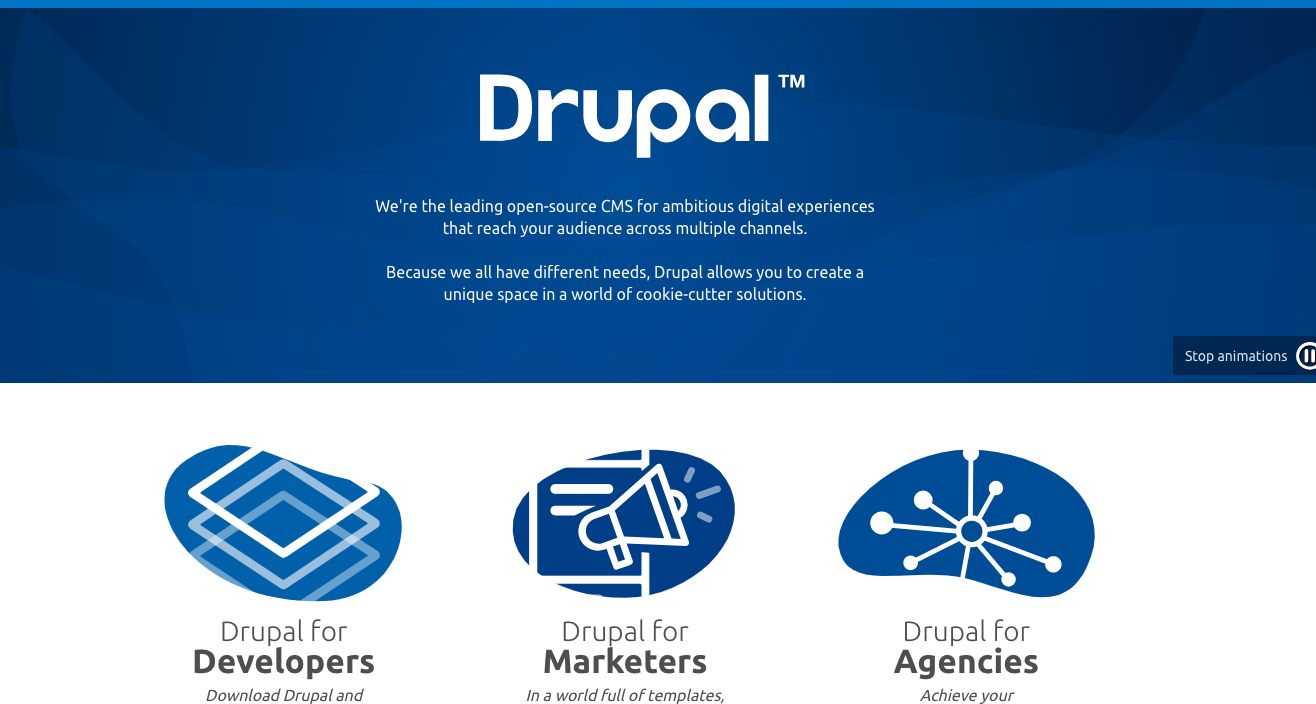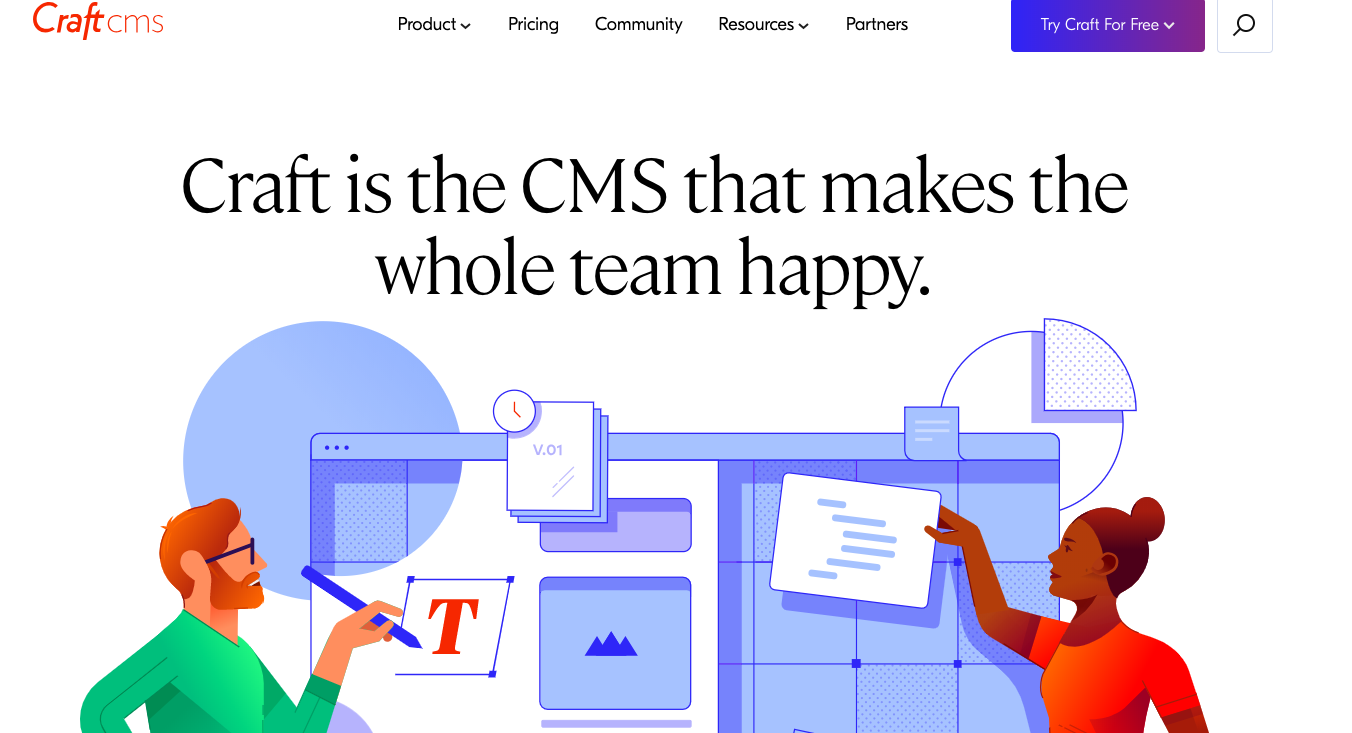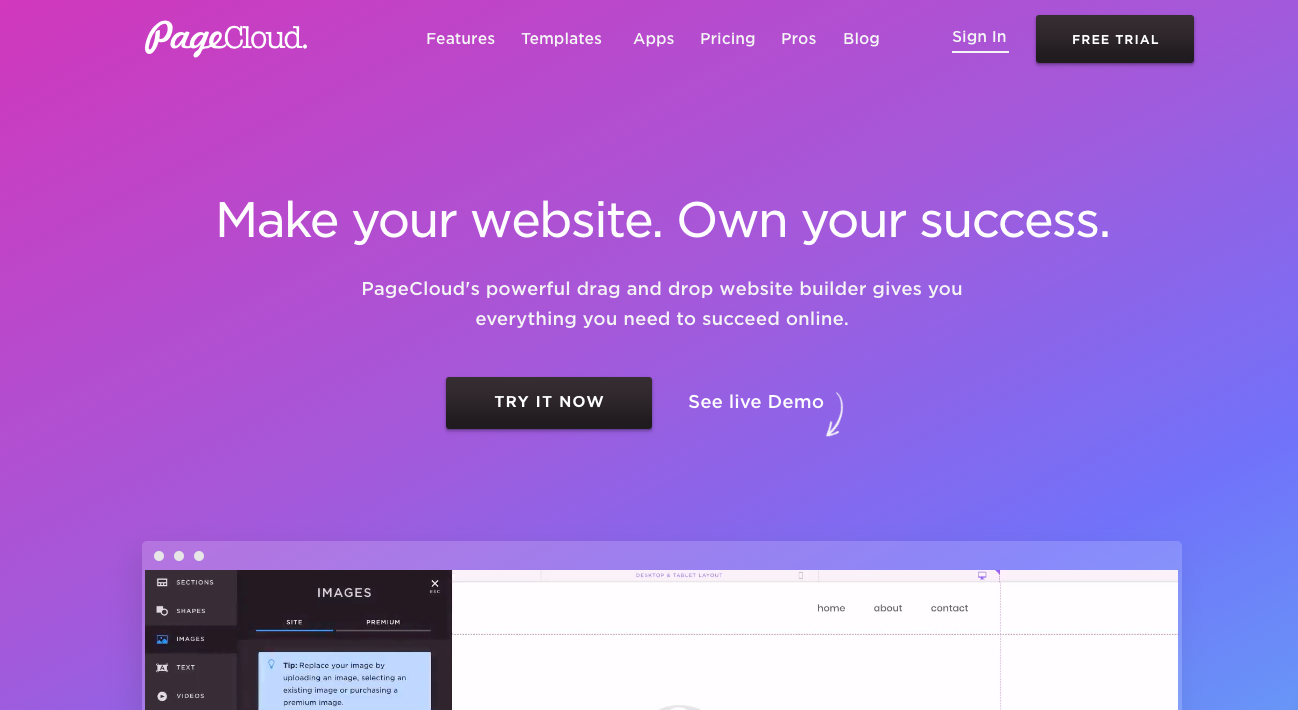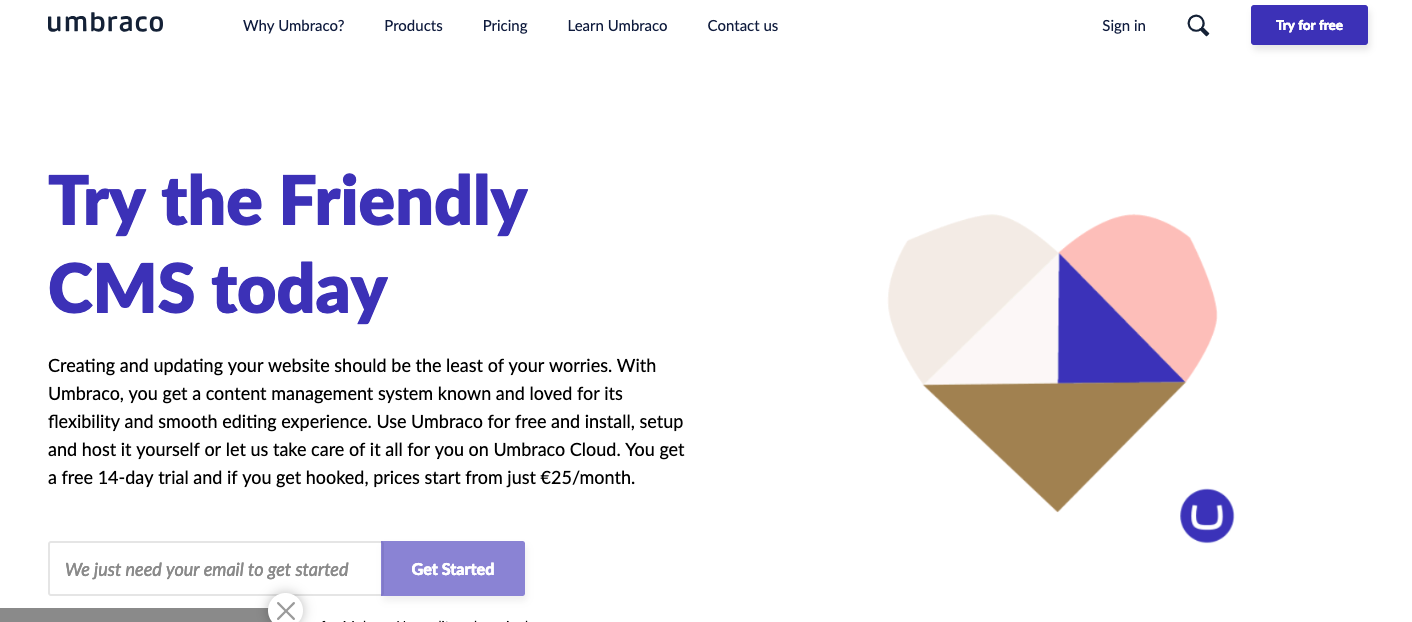15 WordPress Alternatives That Are Worth Your Attention

WordPress is undoubtedly one of the leading platforms for building a website. However, with the advancement of technology, new alternatives to WordPress have emerged, comprising unique and enthralling features. Therefore, sticking to the older version is unnecessary when you have much to experiment with. But before taking the plunge, it’s essential to consider a platform’s positive and negative aspects to draw a firm conclusion.
So, here are the top 15 alternatives to WordPress that shouldn’t be missed at any cost. But before that, let’s know a bit more about CMS.
What is CMS?
CMS stands for Content management system, which deals with the creation and modification of content digitally available on the web. This platform can integrate several users under one window. Moreover, it includes a variety of features, such as Search Engine Optimization, online documentation, etc., to ensure the effective functioning of your site.
Best WordPress Alternatives
There are various types of CMS available on the Internet. Each one has a distinct set of features and uses. Broadly, there are two types: open-source CMS and Proprietary CMS.
Here are the 15 popular alternatives to WordPress you can use to deal with your content management.
1. Joomla

Joomla is free. It is a multi-based platform based on the model-see controller web application system. With a massive number of clients close by, it will be in its fourteenth year of foundation in 2019.
Much like WordPress plugins, Joomla can extend its functionalities with extra expansions in particular segments, modules, formats, dialects, libraries, documents, and bundles. This way, Joomla can help you build your website with all the essential features.
Pros:
- Free modification & distribution of code
- Available extensions for e-commerce
- Intuitive content editing & structure flexibility
Cons:
- More complex than WordPress
- Limited marketplace for additional modules
- Difficult maintenance of modules
Pricing:
Joomla services are available without any cost. However, there are some web hosting charges involved that you may have to bear.
2. Drupal

It’s an open-source CMS that you can use to convey an increasingly yearning for advanced understanding. For the most part, Drupal is recommended for specialists as it allows you to make online journals, individual sites, and even long-range interpersonal communication locales. It is also one of the best alternative for websites like WordPress in the market.
While some modules and topics expand the highlights and looks, beginners find it somewhat tricky when designing a website. However, Drupal’s unpredictability is suitable for dealing with tremendous information, making it perfect for relatively more prominent corporate institutions.
Pros:
- Perfect for making detailed sites
- Permits quick prototyping
- Complex work can be done in a short period
Cons:
- Takes time to learn
- Difficult to install
- The average standard of modules
Pricing:
The Drupal platform services are free, but you might need to cover the web hosting expenses.
3. Craft CMS

Craft CMS is now one of the WordPress alternatives. Some actual instances of its implementation are Netflix and Salesforce sites. However, a considerably more difficult CMS stage gives restrictive back-closures to your sites. However, it’s a highly adaptable and extensible platform that can cater to your content management needs. Moreover, it lets you set up your own content type utilizing 18 unique fields.
Pros:
- Amazing at content management
- Not bloated but lightweight
- Striking features in commercial packages
Cons:
- Expensive for advanced requirements
- No one-click installation of templates
- The average community of developers
Pricing:
If you’re building a solo website to entertain your hobby, you can do so for free. However, for professional use, you’d have to pay $299/per project. And, if you have a massive enterprise, the charges will be different. You can get in touch with customer support to learn more.
4. Shopify

Shopify is an astounding option that enables the effortless development of online stores. It’s a straightforward, secure, and stable platform where you can begin and develop your business with extremely little exertion.
Being very adaptable empowers business visionaries to concentrate on their items and the expansion of their brand. Moderately simple to control, Shopify utilizes and offers several free and premium subjects to look over. What’s extraordinary is that Shopify additionally provides the client with the alternative to selling their items through internet-based life by incorporating a Buy Now feature.
Pros:
- The cheapest option to sell online with the hosting solution
- Inexpensive functionality of abandoned cart saver
- Real-time shipping option
Cons:
- Centered around e-commerce & not very adaptable
- No alternatives to broaden the SEO
- Blogging usefulness isn’t very productive
Pricing:
The price of this platform varies from $81.50 to $2033 every month, depending on what you choose from available options. You can also pay annually or biennially. Shopify also provides a 14-day trial to satisfy you enough before you spend the money.
5. BigCommerce

It’s a facilitated web-based business arrangement that enables clients to set up their online store and sell their stuff. It’s adaptable and empowers business owners, whether learners or specialists, to utilize the services and make a perfect stage for their business.
It additionally incorporates applications to enable you to make your site fully operational. Even though it’s not as cutting-edge as other CMS platforms, BigCommerce’s blogging capacities are quite extraordinary. This one allows you to use various payment gateways and sell physical and digital goods on your website.
Pros:
- All-in-one solution for online stores
- Does not require any exchange charge
- Uptime assurance
Cons:
- Expensive themes
- The subject proofreader isn’t quite cutting-edge
- Annual online sales are limited
Pricing:
The plan options have different variants, ranging from Standard ($29.95/month), Plus ($79.95/month), to Pro ($249.95/month).
6. Wix

Wix is presumably a standout amongst the easiest-to-understand CMS platforms out there. It utilizes the “What You See Is What You Get” editor, which makes the entire procedure much less demanding.
Another astounding thing about this platform is that it empowers clients to enliven writing and different components. This unquestionably adds to the productivity and captivating element of this platform.
Pros:
- Easy to use
- Striking highlights and features
- Planned & accessible layouts accessible
Cons:
- Advertisements are incorporated with the free plans
- You cannot add a custom domain name to your site
- A limited number of themes and layouts are available
Pricing:
Wix has come up with various prices, from basic free services to the $25/month package.
7. Weebly

Another one on the list of alternatives to WordPress is Weebly, a smooth online webpage builder that allows clients to create and assemble the perfect website effectively. The “Drag and Drop Page” makes the procedure simple.
Weebly has a conventional measure of stunning subjects to look over and alter. The tools are generally super easy to understand and simple to use. Basically, Weebly is an entirely incredible alternative to WordPress and is reasonable for smaller sites.
Pros:
- Most appropriate for amateurs
- Templates are easy to edit and look amazing
- Easy to understand and use
Cons:
- No alternative to adding custom content
- Difficult to include some advanced advertising tools
- Relocation to different stages can be stressful
Pricing:
There are two variants: one is the free version, and you’d have to pay $25/month for the premium package.
8. Squarespace

With a straightforward technique, Squarespace is the perfect platform for creating a major site. In contrast to conventional Page Builder, you don’t have to sign up or buy a space. It incorporates a simplified tool that you can use to include and alter the site’s components. Its templates are designed using the latest CSS, Javascript, and HTML while keeping mobile devices and modern browsers in mind.
Pros:
- No need to sign up
- Can create your design using simple tools
- Great for beginners
Cons:
- Does not offer a versatile editorial manager
- An absence of help from outside modules
- Costlier plans than other options
Pricing:
Contrary to most platforms, there is no free version of this. The packages range from $8/month to $24/month.
9. Ghost

Being a NodeJS-based blogging open-source platform, this one was structured particularly to make web page development a seamless job. It’s readily available and lightweight as well.
Adequate for beginners, bloggers, or anybody hoping to make a basic, luxurious, and straightforward-to-oversee site, Ghost can be an excellent alternative for WordPress to fulfill all your requirements.
Pros:
- Clean & straightforward dashboard design
- Live preview feature
- Easy to use and ideal for beginners
Cons:
- Still in the testing phase
- No adequate plugins to install
- Not suitable for all sorts of websites
Pricing:
The basic version of this platform can be accessed for free. However, its excellent variety can cost you up to $200/month.
10. Medium

Medium is one of the fastest developing platforms competent enough to provide cut-throat competition to WordPress or other CMS alternatives. It’s anything but problematic to use and comprehend. Furthermore, this platform also includes a built-in social networking feature. Additionally, its integrated stats functionality lets you keep an eye on the traffic engaged with your blog.
Pros:
- The exceptionally extensive audience base
- Easy to use and work with
- A large community of like-minded people
Cons:
- Limited ownership and control
- Less potential for creating fantastic leads
- Less access to the examination
Pricing:
The basic version is free, but access to the premium features would cost you $5/month or $50/year.
11. PageCloud

If you’re searching for a visually gorgeous alternative to WordPress, PageCloud is for you. Its remarkable modifying knowledge has set high standards for WYSIWYG and drag-and-drop altering. With PageCloud, you can include and reposition pretty much anything on your pages.
Even though it probably won’t be the best decision for locales with several pages, it gives proprietors full command over their sites without the need to compose any code.
Pros:
- The benefit of visual editing
- A variety of easy-to-use app tools
- Power to access the source code
Cons:
- Various design limitations
- Certain overlapping issues
- No spam filter in the email signup list
Pricing:
This platform has divided its packages into two categories: monthly and annual. Monthly packages cost $24, and annual packages cost $240.
12. Tumblr

Further, it can be considered an effective alternative to WordPress for website or blog maintenance. Tumblr enables you to submit short-structure content, such as blog entries, articles, pictures, recordings, etc., and distribute it on a microblog.
You can associate with different bloggers on this platform and communicate better with the experts in your domain. Tumblr is an expedited content management solution that gives you the sophisticated space required to run a microblog.
Pros:
- Pre-made styles for standard content types
- Access to an entire network of substance distributors
- Easy to operate
Cons:
- Not a lot of quality themes are available
- Design & customization limitations
- Dependability on the server
Pricing:
Tumblr is a free web-hosted service and doesn’t cost you a penny.
13. Jimdo

Talking about Jimdo, one of the most impressive features of this platform is that it uses AI-powered technology to help you create a site or a blog within three minutes. Moreover, it even offers users with unlimited bandwidth and storage space. Its streamlined design and structure would be enough to make you stay for an extended period.
Pros:
- Integration of social media platforms & Google Maps
- Availability of modern site template with different categories
- Efficient features for content editing
Cons:
- Limited disk space in free plans
- No flexibility in templates
- No site export option
Pricing:
The basic version of Jimdo is free of cost, and you’d need to pay $21/month to use the premium package.
14. Expression Engine

Expression Engine is another considerable WordPress competitor. Thanks to its as it offers real-time preview option amidst everything else. With this alternative, you have the ultimate freedom to spark creativity.
There is no concern regarding privacy as it’s known to be highly secure and safe, making it a WordPress alternative. It’s one of the fastest open-source CMS that claims to keep you on the safe side.
Pros:
- Diversity in templates
- Availability of anti-spam tools
- An excellent user management system
Cons:
- Limited features in the free version
- Not many choices in add-ons
- Not-so-intuitive interface
Pricing:
ExpressionEngine requires a one-time single payment of $299. You can also take advantage of its free trial to assess its features.
15. Umbraco

Built on Microsoft .NET technology. Umbraco is a perfect CMS WordPress. Alternatives are an option for those who are deeply engraved into .NET advancements. However, if you’re thinking of using it as a personal blog, you might have to look out for something else as it doesn’t fit the suit. It’s the best option for organizations and those running large websites.
Pros:
- Doesn’t need back-end programming
- Inbuilt user management
- Clear admin tool
Cons:
- Courier plugin doesn’t always work well
- Small developers’ community
- Restricted plugins for functionality
Pricing:
This friendly open-source platform comes with three different packages, starting from $28.24/month. You can choose the one that best fits your needs and requirements.
Conclusion
In today’s fast-changing digital world, choosing the right content management system (CMS) is essential for establishing and managing a successful online presence.
Despite WordPress’s continued dominance, numerous alternative options with distinct features and benefits might better suit your specific requirements.
These platforms cater to a wide range of users and projects, offering diverse options for different needs, including ease of use, advanced customization, or specialized tools.
By exploring these alternatives to WordPress, you can make an informed choice and ensure that your website serves your current needs and adapts to future demands.
Choosing wisely will establish a solid and sustainable online presence.
If you liked this article you might also like:


Leave a Reply